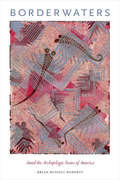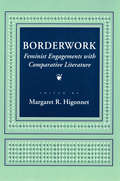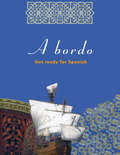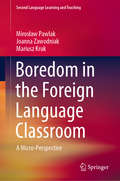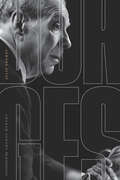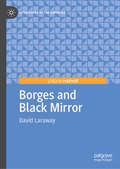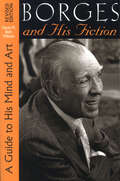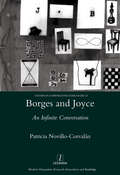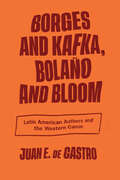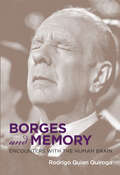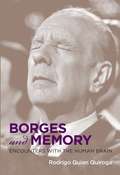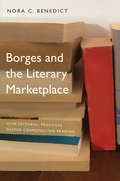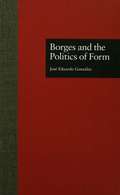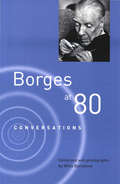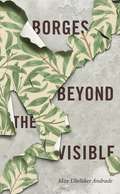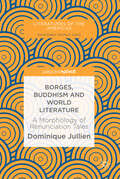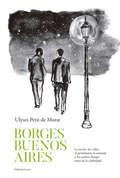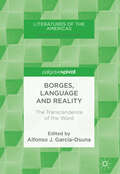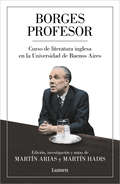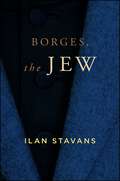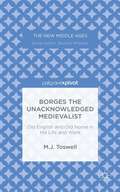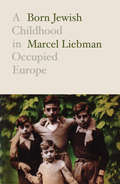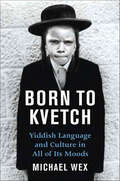- Table View
- List View
Borderwaters: Amid the Archipelagic States of America
by Brian Russell RobertsConventional narratives describe the United States as a continental country bordered by Canada and Mexico. Yet, since the late twentieth century the United States has claimed more water space than land space, and more water space than perhaps any other country in the world. This watery version of the United States borders some twenty-one countries, particularly in the archipelagoes of the Pacific and the Caribbean. In Borderwaters Brian Russell Roberts dispels continental national mythologies to advance an alternative image of the United States as an archipelagic nation. Drawing on literature, visual art, and other expressive forms that range from novels by Mark Twain and Zora Neale Hurston to Indigenous testimonies against nuclear testing and Miguel Covarrubias's visual representations of Indonesia and the Caribbean, Roberts remaps both the fundamentals of US geography and the foundations of how we discuss US culture.
Borderwork: Feminist Engagements with Comparative Literature (Reading Women Writing)
The first book to assess the impact of feminist criticism on comparative literature, Borderwork recharts the intellectual and institutional boundaries on that discipline. The seventeen essays collected here, most published for the first time, together call for the contextualization of the study of comparative literature within the areas of discourse, culture, ideology, race, and gender. Contributors: Bella Brodzki, VèVè A. Clark, Chris Cullens, Greta Gaard, Sabine Gölz, Sarah Webster Goodwin, Margaret R. Higonnet, Marianne Hirsch, Susan Sniader Lanser, Françoise Lionnet, Fedwa Malti-Douglas, Lore Metzger, Nancy K. Miller, Obioma Nnaemakea, Rajeswari Sunder Rajan, Anca Vlasopolos.
A Bordo: Get Ready for Spanish
by Spanish Course TeamIdeal for near beginners, A bordo takes learners up to the equivalent of GCSE level Spanish. The course is accompanied by three audio-cassettes which include drama and dialogue. Features include:* focus on both Spanish and Latin-American culture* emphasis on communicating in everyday situations* varied exercises, with answer key and progress resumé at the end of each unit.A bordo is the preparatory course for En rumbo, also devised by the Open University Spanish team (see below).
Boredom in the Foreign Language Classroom: A Micro-Perspective (Second Language Learning and Teaching)
by Mirosław Pawlak Joanna Zawodniak Mariusz KrukThe book focuses on boredom, a construct that has been explored in educational psychology but has received only scant attention from second language acquisition researchers. Although recent years have seen a growing interest in positive emotions in second or foreign language learning and teaching, negative emotions are always present in the classroom and they deserve to be investigated in their own right. The theoretical part provides an overview of the construct of boredom (e.g., definitions, types, empirical studies in the L2 classroom). The empirical part reports the findings of an empirical study which aimed to examine the changes in the levels of boredom experienced by a group of English majors in English classes and identify the factors accounting for such changes. The book closes with a discussion of directions for further research as well as some pedagogic implications.
Borges: An Introduction
by Julio PrematThis book, available for the first time in English, offers a thorough introductory reading of Jorge Luis Borges, one of the most remarkable and influential writers of the twentieth century. Julio Premat, a specialist in the field of Borges studies, presents the main questions posed by Borges's often paradoxical writing, and leads the novice through the complexity and breadth of Borges's vast literary production. Originally published in French by an Argentine ex-pat living in Paris, Borges includes the Argentine specificities of Borges&’s work—specificities that are often unrecognized or glossed over in Anglophone readings. This book is a boon for university students of philosophy and literature, teachers and researchers in these fields who are looking to better understand this complex author, and anyone interested in the advanced study of literature. Somewhere between a guidebook and an exhaustive work of advanced research, Borges is the ultimate stepping-stone into the deeper Borgesian world.
Borges and Black Mirror (Literatures of the Americas)
by David LarawayBorges and Black Mirror convenes a dialogue between one of the most influential writers of the twentieth century, the philosophical fabulist Jorge Luis Borges, and one of the most important writers and producers of the twenty-first century, Charlie Brooker, whose Black Mirror series has become a milestone in an age of “post-television” programming. The book’s introduction provides a detailed examination of the terms of engagement of Borges and Brooker and each of the chapters explores in a sustained way the resonances and affinities between one particular story by Borges and one particular episode of Black Mirror. The result is a series of essays that locate Brooker’s work with respect to a rich literary and philosophical tradition on the one hand and, on the other, demonstrate the relevance of Borges’s work for anyone who wishes to understand one of our most emblematic cultural artifacts in the age of Netflix.
Borges and His Fiction: A Guide to His Mind and Art (Texas Pan American Series)
by Gene H. Bell-VilladaThe acclaimed author of García Márquez delivers &“a compulsively readable account of the life and works of our greatest . . . writer of fantasy&” (New York Daily News). Since its first publication in 1981, Borges and His Fiction has introduced the life and works of this Argentinian master-writer to an entire generation of students, high school and college teachers, and general readers. Responding to a steady demand for an updated edition, Gene H. Bell-Villada has significantly revised and expanded the book to incorporate new information that has become available since Borges&’ death in 1986. In particular, he offers a more complete look at Borges and Peronism and Borges&’ personal experiences of love and mysticism, as well as revised interpretations of some of Borges&’ stories. As before, the book is divided into three sections that examine Borges&’ life, his stories in Ficciones and El Aleph, and his place in world literature. &“Of the scores of Borges studies by now published in English, Bell-Villada&’s excellent book stands out as one of the freshest and most generally helpful . . . Lay readers and specialists alike will find his book a valuable and highly readable companion to Ficciones and El Aleph.&” —Choice
Borges and His Fiction: A Guide to His Mind and Art (Texas Pan American Series)
by Gene H. Bell-VilladaFrom reviews of the first edition: "A compulsively readable account of the life and works of our greatest. . . writer of fantasy. With a keen appreciation of Borges himself and a pleasant disregard for the critical cliches, Bell-Villada tells us all we really want to know about the modern master-from pronouncing his name to understanding the stories. " --New York Daily News "Of the scores of Borges studies by now published in English, Bell-Villada's excellent book stands out as one of the freshest and most generally helpful. . . . Lay readers and specialists alike will find his book a valuable and highly readable companion to Ficciones and El Aleph. " --Choice Since its first publication in 1981, Borges and His Fiction has introduced the life and works of this Argentinian master-writer to an entire generation of students, high school and college teachers, and general readers. Responding to a steady demand for an updated edition, Gene H. Bell-Villada has significantly revised and expanded the book to incorporate new information that has become available since Borges' death in 1986. In particular, he offers a more complete look at Borges and Peronism and Borges' personal experiences of love and mysticism, as well as revised interpretations of some of Borges' stories. As before, the book is divided into three sections that examine Borges' life, his stories in Ficciones and El Aleph, and his place in world literature.
Borges and Joyce: An Infinite Conversation
by Patricia Novillo-Corvalan"Borges and Joyce stand as two of the most revolutionary writers of the twentieth-century. Both are renowned for their polyglot abilities, prodigious memories, cyclical conception of time, labyrinthine creations, and for their shared condition as European emigres and blind bards of Dublin and Buenos Aires. Yet at the same time, Borges and Joyce differ in relation to the central aesthetic of their creative projects: the epic scale of the Irishman contrasts with the compressed fictions of the Argentine. In this comprehensive and engaging study, Patricia Novillo-Corvalan demonstrates that Borges created a version of Joyce refracted through the prism of his art, thus encapsulating the colossal magnitude of Ulysses and Finnegans Wake within the confines of a nutshell. Separate chapters triangulate Borges and Joyce with the canonical legacy of Homer, Dante, and Shakespeare using as a point of departure Walter Benjamin's notion of the afterlife of a text. This ambitious, interdisciplinary study offers a model for Comparative Literature in the twenty-first century."
Borges and Kafka, Bolaño and Bloom: Latin American Authors and the Western Canon
by Juan E. De CastroAt a time in which many in the United States see Spanish America as a distinct and, for some, threatening culture clearly differentiated from that of Europe and the US, it may be of use to look at the works of some of the most representative and celebrated writers from the region to see how they imagined their relationship to Western culture and literature. In fact, while authors across stylistic and political divides—like Gabriela Mistral, Jorge Luis Borges, or Gabriel García Márquez—see their work as being framed within the confines of a globalized Western literary tradition, their relationship, rather than epigonal, is often subversive.Borges and Kafka, Bolaño and Bloom is a parsing not simply of these authors' reactions to a canon, but of the notion of canon writ large and the inequities and erasures therein. It concludes with a look at the testimonial and autobiographical writings of Rigoberta Menchú and Lurgio Gavilán, who arguably represent the trajectory of Indigenous testimonial and autobiographical writing during the last forty years, noting how their texts represent alternative ways of relating to national and, on occasion, Western cultures. This study is a new attempt to map writers' diverse ways of thinking about locality and universality from within and without what is known as the canon.
Borges and Memory: Encounters with the Human Brain
by Rodrigo Quian QuirogaA scientist's exploration of the working of memory begins with a story by Borges about a man who could not forget. Imagine the astonishment felt by neuroscientist Rodrigo Quian Quiroga when he found a fantastically precise interpretation of his research findings in a story written by the great Argentinian fabulist Jorge Luis Borges fifty years earlier. Quian Quiroga studies the workings of the brain—in particular how memory works—one of the most complex and elusive mysteries of science. He and his fellow neuroscientists have at their disposal sophisticated imaging equipment and access to information not available just twenty years ago. And yet Borges seemed to have imagined the gist of Quian Quiroga's discoveries decades before he made them.The title character of Borges's "Funes the Memorious" remembers everything in excruciatingly particular detail but is unable to grasp abstract ideas. Quian Quiroga found neurons in the human brain that respond to abstract concepts but ignore particular details, and, spurred by the way Borges imagined the consequences of remembering every detail but being incapable of abstraction, he began a search for the origins of Funes. Borges's widow, María Kodama, gave him access to her husband's personal library, and Borges's books led Quian Quiroga to reread earlier thinkers in philosophy and psychology. He found that just as Borges had perhaps dreamed the results of Quian Quiroga's discoveries, other thinkers—William James, Gustav Spiller, John Stuart Mill—had perhaps also dreamed a story like "Funes."With Borges and Memory, Quian Quiroga has given us a fascinating and accessible story about the workings of the brain that the great creator of Funes would appreciate.
Borges and Memory
by Rodrigo Quian Quiroga Juan Pablo FernándezImagine the astonishment felt by neuroscientist Rodrigo Quian Quiroga when he found a fantastically precise interpretation of his research findings in a story written by the great Argentinian fabulist Jorge Luis Borges fifty years earlier. Quian Quiroga studies the workings of the brain--in particular how memory works--one of the most complex and elusive mysteries of science. He and his fellow neuroscientists have at their disposal sophisticated imaging equipment and access to information not available just twenty years ago. And yet Borges seemed to have imagined the gist of Quian Quiroga's discoveries decades before he made them. The title character of Borges's "Funes the Memorious" remembers everything in excruciatingly particular detail but is unable to grasp abstract ideas. Quian Quiroga found neurons in the human brain that respond to abstract concepts but ignore particular details, and, spurred by the way Borges imagined the consequences of remembering every detail but being incapable of abstraction, he began a search for the origins of Funes. Borges's widow, María Kodama, gave him access to her husband's personal library, and Borges's books led Quian Quiroga to reread earlier thinkers in philosophy and psychology. He found that just as Borges had perhaps dreamed the results of Quian Quiroga's discoveries, other thinkers--William James, Gustav Spiller, John Stuart Mill--had perhaps also dreamed a story like "Funes. " With Borges and Memory, Quian Quiroga has given us a fascinating and accessible story about the workings of the brain that the great creator of Funes would appreciate.
Borges and the Literary Marketplace: How Editorial Practices Shaped Cosmopolitan Reading
by Nora C. BenedictA fascinating history of Jorge Luis Borges&’s efforts to revolutionize and revitalize literature in Latin America Jorge Luis Borges (1899–1986) stands out as one of the most widely regarded and inventive authors in world literature. Yet the details of his employment history throughout the early part of the twentieth century, which foreground his efforts to develop a worldly reading public, have received scant critical attention. From librarian and cataloguer to editor and publisher, this writer emerges as entrenched in the physical minutiae and social implications of the international book world. Drawing on years of archival research coupled with bibliographical analysis, this book explains how Borges&’s more general involvement in the publishing industry influenced not only his formation as a writer, but also global book markets and reading practices in world literature. In this way it tells the story of Borges&’s profound efforts to revolutionize and revitalize literature in Latin America through his varying jobs in the publishing industry.
Borges and the Politics of Form
by Jose Eduardo GonzalezJorge Luis Borges-one of the most important Latin American writers-has also attained considerable international stature, and his work is commonly cited in a wide array of scholarship on contemporary fiction. Partly as a consequence of Borges' international identity, and partly because of a long-standing view in Borges criticism that his writing is principally concerned with abstract ideas, critics have been reluctant to address the question of politics in his writingFilling this critical gap, Gonzalez begins by rejecting the proposition that Borges withdraws from the "real," and provides a detailed analysis of the various political issues that Borges takes up in his essays and short stories. The author places particular emphasis on the turbulent questions that shaped Argentine social history during the period of Borges' output.
Borges at Eighty: Conversations
by Jorge Luis Borges Willis BarnstoneA collection of interviews now available from New Directions for the first time The words of a genius: Borges at Eighty transcends our expectations of ordinary conversation. In these interviews with Barnstone, Dick Cavett, and Alastair Reid, Borges touches on favorite writers (Whitman, Poe, Emerson) and familiar themes -- labyrinths, mystic experiences, and death -- and always with great, throw-away humor. For example, discussing nightmares, he concludes,"When I wake up, I wake to something worse. It's the astonishment of being myself."
Borges Beyond the Visible
by Max Ubelaker AndradeBorges Beyond the Visible presents radically new readings of some of Jorge Luis Borges’s most celebrated stories. Max Ubelaker Andrade shows how Borges employed intertextual puzzles to transform his personal experiences with blindness, sexuality, and suicide while allowing readers to sense the transformative power of their own literary imaginations.In readings of "Tlön, Uqbar, Orbis Tertius," "El Aleph," and "El Zahir," Ubelaker Andrade argues that Borges, considering his own impending blindness, borrowed from Islam’s prohibitions on visual representation to create a "literary theology"—a religion focused on the contradictions of literary existence and the unstable complexities of a visual world perceived without everyday sight. Embracing these contradictions allowed Borges to transform his relationships with sex, sexuality, and family in multilayered stories such as "Emma Zunz," "La intrusa," and "El jardín de senderos que se bifurcan." Yet these liberating transformations, sometimes offered to the reader as a paradoxical "gift of death," are complicated by "La salvación por las obras," a story built around Borges’s relationship with a suicidal reader and the woman to whom they were both connected. The epilogue presents "Místicos del Islam," an unpublished essay draft by Borges, as a key source of insight into an irreverent, iconoclastic writing practice based on a profound faith in fiction.Compelling and clear, Borges Beyond the Visible is a revelatory examination of the work of one of the most influential authors of the twentieth century. It opens up exciting areas of inquiry for scholars, students, and readers of Borges.
Borges Beyond the Visible
by Max Ubelaker AndradeBorges Beyond the Visible presents radically new readings of some of Jorge Luis Borges’s most celebrated stories. Max Ubelaker Andrade shows how Borges employed intertextual puzzles to transform his personal experiences with blindness, sexuality, and suicide while allowing readers to sense the transformative power of their own literary imaginations.In readings of “Tlön, Uqbar, Orbis Tertius,” “El Aleph,” and “El Zahir,” Ubelaker Andrade argues that Borges, considering his own impending blindness, borrowed from Islam’s prohibitions on visual representation to create a “literary theology”—a religion focused on the contradictions of literary existence and the unstable complexities of a visual world perceived without everyday sight. Embracing these contradictions allowed Borges to transform his relationships with sex, sexuality, and family in multilayered stories such as “Emma Zunz,” “La intrusa,” and “El jardín de senderos que se bifurcan.” Yet these liberating transformations, sometimes offered to the reader as a paradoxical “gift of death,” are complicated by “La salvación por las obras,” a story built around Borges’s relationship with a suicidal reader and the woman to whom they were both connected. The epilogue presents “Místicos del Islam,” an unpublished essay draft by Borges, as a key source of insight into an irreverent, iconoclastic writing practice based on a profound faith in fiction.Compelling and clear, Borges Beyond the Visible is a revelatory examination of the work of one of the most influential authors of the twentieth century. It opens up exciting areas of inquiry for scholars, students, and readers of Borges.
Borges, Buddhism and World Literature: A Morphology of Renunciation Tales (Literatures of the Americas)
by Dominique JullienThis book follows the renunciation story in Borges and beyond, arguing for its centrality as a Borgesian compositional trope and as a Borgesian prism for reading a global constellation of texts. The renunciation story at the heart of Buddhism, that of a king who leaves his palace to become an ascetic, fascinated Borges because of its cross-cultural adaptability and metamorphic nature, and because it resonated so powerfully across philosophy, politics and aesthetics. From the story and its many variants, Borges’s essays formulated a 'morphological' conception of literature (borrowing the idea from Goethe), whereby a potentially infinite number of stories were generated by transformation of a finite number of 'archetypes'. The king-and-ascetic encounter also tells a powerful political story, setting up a confrontation between power and authority; Borges’s own political predicament is explored against the rich background of truth-telling renouncers. In its poetic variant, the renunciation archetype morphs into stories about art and artists, with renunciation a key requirement of the creative process: the discussion weaves in and out of Borges to highlight modern writers’ debt to asceticism. Ultimately, the enigmatic appeal of the renunciation story aligns it with the open-endedness of modern parables.
Borges Buenos Aires: La noche, las calles, el periodismo, la amistad y los sueños: Borges antes de la celebridad
by Ulyses Petit de MuratCrónica de la amistad más antigua y más larga que tuvo Borges (nace en los años veinte y se prolonga por más de medio siglo) y fresco de la Buenos Aires de los años treinta y cuarenta. Biografía de primera mano del Borges joven y aún desconocido. Antes de ser consagrado mundialmente como uno de los escritores más importantes del siglo XX, hubo un Borges joven, apodado familiarmente Georgie, que trajinó la noche de Buenos Aires en extensas caminatas junto a un compañero de ruta con el que cultivaba el hábito de la ciudad, el dominio del verso y ciertas perplejidades metafísicas: Ulyses Petit de Murat, "compartidor de calles y de versos", y tal vez su amistad más antigua y más larga. Poco antes de morir, al escribir este, su último libro, Ulyses deja el único testimonio sobre los años en que su amigo, que todavía es joven y goza de la vista, se alimenta fruitivamente del material que será sustrato de las obsesiones que cristalizarán posteriormente en su obra de hombre de letras famoso, maduro y ciego. A pesar de que no hay otra crónica tan de primera mano sobre el Borges de las décadas del veinte al cuarenta (los diarios de Bioy registran lo que va de los cincuenta en adelante), la felicidad de estas páginas va mucho más allá de lo meramente biográfico: está cifrada en la celebración de la amistad entre dos hombres y su ciudad.
Borges, Language and Reality: The Transcendence of the Word (Literatures of the Americas)
by Alfonso J. García-OsunaThis book brings together the work of several scholars to shed light on the Argentine author Jorge Luis Borges' complex relationship with language and reality. A critical assumption driving the work is that there is, as Jaime Alazraki has put it, 'a genuine effort to overcome the narrowness that Western tradition has imposed as a master and measure of reality' in Borges' writing. That narrowness is in large measure a consequence of the chronic influence of positivist approaches to reality that rely on empirical evidence for any authentication of what is 'real'. This study shows that, in opposition to such restrictions, Borges saw in fiction, in literature, the most viable means of discussing reality in a pragmatic manner. Moreover, by scrutinising several of the author's works, it establishes signposts for considering the truly complicated relationship that Borges had with reality, one that intimately associates the 'real' with human perception, insight and language.
Borges profesor: Curso de literatura inglesa en la Universidad de Buenos Aires
by Jorge Luis BorgesEl libro que revela a Borges en su faceta docente, imprescindible para los amantesde su obra y de la literatura. «No lo cite: léalo. [...] Urge no ya leerlo o releerlo, sino, como sugería Bolaño, "releerlo otra vez".»Gonzalo Núñez, La Razón En 1966, Borges dictó un curso de literatura inglesa en la Universidad de Buenos Aires. Las clases fueron grabadas por algunos alumnos, que luego las transcribieron para que otros pudieran escucharlas. Las cintas originales se han perdido, pero los textos se han conservado hasta hoy. Tras un intenso trabajo de análisis e investigación de las fuentes, Martín Arias y Martín Hadis lograron compilar las transcripciones, sin modificar el lenguaje oral de Borges, que nos ha llegado intacto. La pasión de Borges, conjugada con su memoria casi infalible, hace de este libro una obra esencial para los admiradores del gran escritor argentino y los amantes de la literatura. Reseñas:«Borges es el escritor en español más importante desde Cervantes. [...] Uno de los artistas contemporáneos más memorables. [...] La deuda que tenemos contraída con él quienes escribimos en español es enorme.»Mario Vargas Llosa «Uno de los escritores más extraordinarios del siglo xx.»The New York Times «Junto con un pequeño séquito de colegas y profetas (se me ocurren Kafka y Joyce), Borges es más que un cuentista sorprendente y un brillante estilista: es un espejo que refl eja el espíritu de su tiempo.»Chicago Tribune «Borges, visionario escéptico, nos fascina. [...] Cumple con nuestro anhelo esencial en cuanto a las razones por que leemos.»Harold Bloom, Cómo leer a Jorge Luis Borges
Borges, the Jew (SUNY series in Latin American and Iberian Thought and Culture)
by Ilan StavansFinalist for the 2016 Foreword INDIES Book of the Year Award in the Religion categoryA Seminary Co-op Notable Book of 2016In this volume, award-winning cultural critic and controversial public intellectual Ilan Stavans focuses his attention on Jorge Luis Borges's fascination with Jewish culture. Despite not being Jewish himself, Borges wrote essays, poems, and stories dealing with various aspects of Jewish history and culture—from the Holocaust to Kabbalah and from Franz Kafka to the creation of the State of Israel. In periods when anti-Semitism in Argentina was on the rise, Borges was clear in his refutation of such xenophobia, and when Jewish writers were hardly available in Spanish, he was among the first to translate them. Throughout Stavans's discussion of these topics he weaves in personal anecdotes on reading Borges for the first time, hearing him read in Mexico, and looking for him in Buenos Aires. No fan of Borges's classic oeuvre will ever see his legacy in the same way after reading this book.
Borges the Unacknowledged Medievalist: Old English and Old Norse in his Life and Work
by M. J. ToswellThe Argentinian writer and poet Jorge Luis Borges (1899-1986) was many things during his life, but what has gone largely unnoticed is that he was a medievalist, and his interest in Germanic medievalism was pervasive throughout his work. This study will consider the medieval elements in Borges creative work and shed new light on his poetry.
Born Jewish: A Childhood in Occupied Europe
by Marcel LiebmanThis fierce memoir is both elegiac and indicting. Marcel Liebman&’s account of his childhood in Brussels under the Nazi occupation explores the emergence of his class-consciousness against a background of resistance and collaboration. He documents the internal class war that has long been hidden from historyhow the Nazi persecution exploited class distinctions within the Jewish community, and how certain Jewish notables collaborated in a systematic program of denunciation and deportation against immigrant Jews who lacked the privileges of wealth and citizenship.An eminent anti-Zionist and Marxist, Liebman tells the story of his family&’s struggle to survive in the face of persecution, terror and constant evasion, an existence observed with acuity, humor and lyricism.
Born to Kvetch: Yiddish Language and Culture in All Its Moods
by Michael Wex“Wise, witty and altogether wonderful. . . . Mr. Wex has perfect pitch. He always finds the precise word, the most vivid metaphor, for his juicy Yiddishisms.” —William Grimes, The New York TimesAs the main spoken language of the Jews for more than a thousand years, Yiddish has had plenty to lament, plenty to conceal. Its phrases, idioms, and expressions paint a comprehensive picture of the mind-set that enabled the Jews of Europe to survive a millennium of unrelenting persecution: they never stopped kvetching—about God, gentiles, children, food, and everything (and anything) else. They even learned how to smile through their kvetching and express satisfaction in the form of complaint.In Born to Kvetch, Michael Wex looks at the ingredients that went into this buffet of disenchantment and examines how they were mixed together to produce an almost limitless supply of striking idioms and withering curses (which get a chapter all to themselves). Born to Kvetch includes a wealth of material that’s never appeared in English before. You’ll find information on the Yiddish relationship to food, nature, divinity, humanity and even sex.This is no bobe mayse (cock-and-bull story) from a khokhem be-layle (idiot, literally a “sage at night” when no one’s looking), but a serious yet fun and funny look at a language that both shaped and was shaped by those who spoke it. From tukhes to goy, meshugener to kvetch, Yiddish words have permeated and transformed English as well.“This treasure trove of linguistics, sociology, history and folklore offers a fascinating look at how, through the centuries, a unique and enduring language has reflected an equally unique and enduring culture.” —Publishers Weekly, starred review
